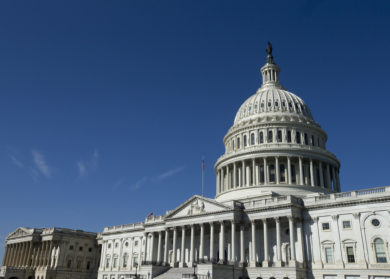June 22, 2017
Early reviews negative on Senate Republicans’ health care bill
NATIONAL
By Mark Pattison, Catholic News Service

The U.S. Capitol in Washington is seen April 5. (CNS photo/Tyler Orsburn)
WASHINGTON (CNS) — Initial reaction from religious leaders was negative to the Better Care Reconciliation Act, the Senate’s health care reform measure that was unveiled June 22 in “discussion draft” form by Senate Majority Leader Mitch McConnell, R-Kentucky.
One feature of the bill is a reduction in the federal government’s share of funding for Medicaid, which offers health coverage to the poor, to 57 percent of its cost over the next seven years. States have picked up the balance of the funding to date.
Under the Affordable Care Act, the government had guaranteed that its funding for adults newly eligible for Medicaid would fall to no lower than 90 percent of their costs. Many states expanded Medicaid coverage for all adults 18 to 65 with incomes up to 133 percent of the federal poverty level.
The bill would reduce tax credits to help people buy insurance and would defund Planned Parenthood for one year under the bill. It is expected the Senate will take up the measure on the floor during the week of June 26.
According to an analysis by AP, the Republicans’ health bill “cuts taxes by nearly $1 trillion over the next decade, mostly for corporations and the richest families in America.”
Three weeks before the Senate bill was unveiled, the chairmen of four U.S. Catholic bishops’ committees urged senators to live up to their “grave obligation” to make sure their health care reform bill respected life, provided access to adequate health care “for all” and was “truly affordable.”
The Senate’s 142-page draft “is not the faithful way forward,” said a June 22 statement from Sister Simone Campbell, a Sister of Social Service who heads the Network Catholic social justice lobby.
“My faith challenges me to heal the sick and care for the widow and the orphan. This Republican bill does the opposite,” she said, adding, “We urge a no vote on the Better Care Reconciliation Act.”
“Learning about the proposed deep cuts in Medicaid passed by the House of Representatives, the American people looked to the Senate. Sadly, the Senate plan proposes even deeper cuts in Medicaid,” said a statement from Larry Couch, director of the Sisters of the Good Shepherd’s National Advocacy Center.
“This wanton disregard for human life must be stopped. Millions of children living in poverty, people with disabilities, and older people in nursing homes will be denied life-saving medicine and care,” Couch added. “Stop this vicious attack on the most vulnerable people in our communities.”
Sister Campbell criticized the Republican-only composition of the bill, and McConnell’s announced intent to have a vote on the bill before the Fourth of July recess, which could severely limit debate on the bill or any amendments.
“This bill is a crass political calculation carried out by 13 white, male senators who are out of touch with the realities of millions of ordinary families in every state,” she said. “Democracy works best when there are hearings, debate, and discussion to craft a bill that works for everyone, not just a few senators.”
Network, Bread for the World and the Sisters of the Good Shepherd are part of the Interfaith Healthcare Coalition, which also includes as members the Presbyterian Church (U.S.A.) Office of Public Witness; the Commission on Social Action of Reform Judaism; the Ecumenical Poverty Initiative; the United Church of Christ Justice & Witness Ministries; and the Friends Committee on National Legislation.
“Ending the Medicaid expansion at a slower rate still means that millions of Americans will have their health care coverage taken away. Senators who support this bill will be voting to take away health insurance from the elderly, the disabled, and children,” said a June 22 statement from the Rev. David Beckmann, a Lutheran minister who is president of Bread for the World, a Christian anti-hunger lobby.
“Medical bills often drive families, especially those who struggle to make ends meet, into hunger and poverty,” Rev. Beckmann added. “Instead of making our health care system worse, Congress should strive to improve the system so that all Americans have the health care coverage they need.”
The Better Care Reconciliation Act which would repeal taxes in the Affordable Care Act — popularly known as Obamacare — and structure subsidies for insurance policy-holders based on their incomes. It also would continue for at least two years to offer reimbursements to health insurance companies for subsidies that reduce out-of-pocket costs for low-income customers of Obamacare plans.
The bill would allow children to stay on their parents’ health plans to age 26. It also would fund $62 billion over eight years to a state innovation fund, which can be used for coverage of high-risk patients, reinsurance and other expenses.
The Congressional Budget Office is expected to issue its “score” of the Senate bill before the end of June.
The CBO’s score of the first House GOP-led Obamacare “repeal and replace” bill, which never came to a vote, estimated that 24 million Americans would lose health insurance over the next decade. Its score on the second bill, which squeaked to a 217-213 victory, estimated that 23 million Americans would lose their health care.
“America deserves better than its failing status quo,” McConnell said June 22 on the Senate floor when introducing the Better Care Reconciliation Act.
Democrats lined up quickly to lambaste it. Sens. Charles Schumer, D-New York, Richard Durbin, D-Illinois, Benjamin Cardin, D-Maryland, Maria Cantwell, D-Washington, and Patty Murray, D-Washington, verbally jousted with McConnell and Senate Majority Whip John Cornyn, R-Texas, over its provisions and how those will affect Americans.
Calling it “mean and heartless legislation,” Murray said the bill is “going to gut Medicaid. It’s going to take away care for our seniors” and “from millions of people across the country,” to “give another massive tax cut for the wealthy and well-connected.”
Follow Pattison on Twitter: @MeMarkPattison.


 Facebook
Facebook Youtube
Youtube
